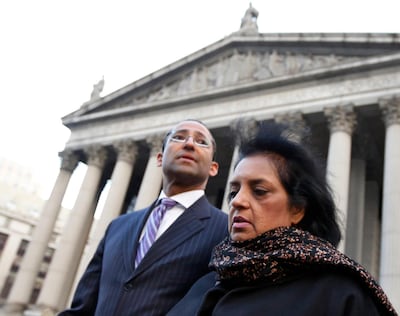"If I could turn back the clock, I would undo so many of my decisions," says the former analyst Roomy Khan.
It has been a decade since Ms Khan was arrested and later pleaded guilty to securities fraud, obstruction of justice and conspiracy in the $60 million Galleon Group hedge fund case, one of the biggest insider trading cases in US history.
"No matter how much you need that job, no matter how much you need that money, at the end of the day nothing is worth breaking the law, nothing," she tells The National , adding that she is still horrified by her behaviour.
Today Ms Khan focuses on urging others in finance and trading to do all they can to protect themselves from what she describes as a ruthless and pressured working environment.
“Even now when I think about it, I start crying. My life has been decimated beyond comprehension and I am aghast at the choices I made,” she says, in an interview after a candid speech to a conference in Abu Dhabi on financial fraud last month.
Indian-born Ms Khan, who lives in Florida, describes how she became caught up in the cut-throat world of hedge fund trading and illegally acted as both ‘tipper’ and ‘tippee’, trading confidential information to broker deals that made her and her compatriots tens of millions of dollars over a 10-year period from the mid-1990s.
She says she is still working out how to rebuild her life after a 12-month stint in a US prison in 2013, followed by a three-year probation that ended last June.
Ms Khan was working in California as an analyst at technology firm Intel Corporation when she met hedge-fund manager Raj Rajaratnam, who founded Galleon Group and is serving an 11-year jail term for masterminding the insider trading ring that netted his firm an estimated $45m.
Ms Khan started providing him with confidential data about Intel when he was an analyst at New York investment bank Needham & Company. The US Federal Bureau of Investigation (FBI) began an inquiry at the time, but that stalled when Ms Khan left Intel in 1998.
In 1999, she joined Mr Rajaratnam at Galleon when his hedge fund expanded to Silicon Valley but she soon left to work as an independent trader, using tips she had learnt from her former boss to source inside information from a network of contacts, and make vast sums of money.
Eventually, the FBI closed in on her in 2007 and she became an undercover informant for six years, helping the government investigate Mr Rajaratnam, who was convicted in 2011, and other parties involved in the huge insider trading scandal.

Ms Khan says it was a combination of thirst for money and power, a fiercely competitive work culture and “feeling of invincibility” that led her to do what she did.
“The culture I worked in encouraged this,” she says. “My boss called it ‘the edge’. It was his mantra, connoting trying to get inside information. After a good trade you’d get a bonus, colleagues would high-five you – once I got a huge bouquet of flowers – and nobody ever questioned how you did it.”
White-collar offences such as insider trading is an “insidious crime”, she says, because the perpetrator feels distanced from his actions and the victim. “A person who is stealing money can see his victim and is taught not to do such things.
“But in this case, you don’t see the victim, you don’t even really understand who the victim is, and you feel far removed [from the crime]. This creates a false sense you are not doing anything wrong, even though you are. You are deceiving the system and getting an unfair advantage and cheating the house.”
Ms Khan says obtaining useful information - legally - is the essence of successful trading, so she convinced herself she was just doing her job. “Unfortunately the job of a trader blends with the whole concept of getting information,” she explains.
“Then it’s about the kill. It becomes hubris – the feeling that you are always right, because you have the information to nail the trade and win at all costs," she says, adding that this compounded with a culture of encouragement is a bad cocktail.
“Think about it. If you could make a couple of million dollars overnight without really stealing anything, just doing a trade, I think a lot of us could compromise our ethics, without even feeling we were.”
It became a “slippery slope” for Ms Khan, who at one point learnt the FBI was on to her and Galleon Group but did not take any visible action, for years. “Nothing happened to Raj, which made the whole thing seem lighter than it was.”
Yet she knew what she was doing was wrong. “I was well aware of the law, I had no doubt in my mind. The culpability of my decision is mine. But I was so caught up in the whole thing I didn’t stop and think, 'oh, this is not right'.”
She thinks stronger compliance requirements would have helped to prevent such illegal activity within the industry, but adds that a culture of “yes, we want you to be right on the trade, but getting inside information is a complete no, no” must be propagated from the top of an organisation.
In addition, strict regulations - many of which are now in place - about when fund managers can make changes to portfolios must be imposed and adhered to.
“I don’t work in that business anymore and I’m sure there are very sophisticated methods of tracking [criminal activity]. If a person has a pattern of getting information before an event, you know it’s a red flag,” she says.
“From a compliance point of view, if you have a trader bringing trades near the earnings season, you’ve got to have rules against trading on certain stock, making portfolio changes, and any other position changes once the quarter is closed.”
______
Read more:
Economics 101: Stop trying to get rich quickly from investments
Saudi regulators tighten their grip ahead of opening to foreign investment
Four banned traders named by Abu Dhabi bourse
______
Since completing her sentence, Ms Khan gives public talks to highlight the damage breaking the law can do to personal and professional lives and help others avoid making the wrong decisions. She also writes a column for Forbes on motivations for white-collar crime.
She says she is fortunate, in that she has been able to rebuild treasured relationships, including with her husband and daughter. But whenever she meets a new person she always asks them to Google her first, and decide whether they would like to get to know her.
“People always judge me. A lot of them are not comfortable dealing with people who have been to jail, so I don’t want to ambush them. I have an obligation to be upfront about this whole thing.”
It’s an ongoing process, she adds. “I’m still looking for a way forward. I want to give back to society in terms of what not to do, because this was a breakdown of my own values and I still cannot put my arms around exactly how my life reached that point.”
Roomy's tips for traders
1. Never break the law.
"Nothing is worth it, I’m telling you. Do not take the law lightly. An FBI agent said to me: 'Listen, you can disagree with the law as much as you like but at the end of the day if you break it you’re going to have a talk with the FBI'. It’s only a matter of when, not if, because people who break the law do it repeatedly and get caught, that’s the way it is."
2. Never underestimate the power of a culture
"This is the biggest lesson I have for anyone who will listen. If everyone around you is engaged in a certain behaviour, you have to stop and question it, and make sure it's OK. I met a forensic accountant who had been troubled by a culture of overbilling within her firm and she had the sanity to question that behaviour and, in the end, the courage to walk away from it."
3. If in doubt, box yourself
"If you are uncomfortable with a position, just walk. Trading is about risk-taking ability. Traders breaking the law don’t want to risk losing money, they want to make money by getting information so a stock behaves in a certain way, usually around events like earnings announcements. So if you don’t know which way the wind will blow, take precautions and box yourself, and then you are indifferent. You'll miss the upside, but you also miss the downside. There are opportunities to get information [legally] during normal windows, through conference calls, investor relations and management."

